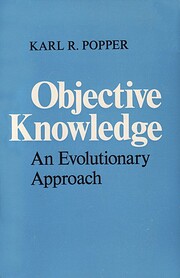

Pulse en una miniatura para ir a Google Books.
|
Cargando... Conocimiento objetivo : un enfoque evolucionista (1972)por Karl R. Popper
 Filosofía - Clásicos (99) Actualmente no hay Conversaciones sobre este libro. sin reseñas | añadir una reseña
Pertenece a las series editoriales
The essays in this volume represent an approach to human knowledge that has had a profound influence on many recent thinkers. Popper breaks with a traditional commonsense theory of knowledge that can be traced back to Aristotle. A realist and fallibilist, he argues closely and in simplelanguage that scientific knowledge, once stated in human language, is no longer part of ourselves but a separate entity that grows through critical selection. No se han encontrado descripciones de biblioteca. |
Debates activosNingunoCubiertas populares
 Google Books — Cargando... Google Books — Cargando...GénerosSistema Decimal Melvil (DDC)121Philosophy and Psychology Philosophy Of Humanity EpistemologyClasificación de la Biblioteca del CongresoValoraciónPromedio: (4.36) (4.36)
¿Eres tú?Conviértete en un Autor de LibraryThing. |
||||||||||||||||||||||||||||||||||||||||||||||||||||||||||||||||||||||||||||||||||||||||||||||||||||||||||||||||||||||||
—Danieljean (Babelio)